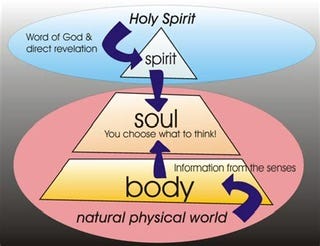SOUL interpretations
“A part of humans regarded as immaterial, immortal, separable from the body at death, capable of moral judgment, and susceptible to happiness or misery in a future state.” - Wordnik
Religions have played a central role in Western cultures, beliefs and traditions.
When I asked my wife this morning to tell me what the noun “soul” means, her description differed greatly from mine. She relates “soul” as her spiritual connection to the “divine”, the “life force” and “Love”. I, on the other hand, think of my “soul” as my instance of consciousness which is immaterial and inseparable from Universal Consciousness - the “co-Creator” of “reality” as I experience it.
When I was a Catholic boy in the 1950s and early 60s, my answer to that question would have been similar to the two images presented. The person who made those images evidently was unsure of the “true nature and function” of the soul, but he clearly understood it in the context of biblical teachings.
I have read that religions are in decline.
Even as church attendance drops, I imagine that the existential questions which most people ask about their lives are as persistent as ever. Many people who have left organized religions still describe themselves as “spiritual” and claim to believe in a “higher power”, a God of Creation, the Holy Trinity including Jesus, or some adaptation to the religious dogma they were formerly taught, likely when church attendance factored more prominently in their weekly routines.
Has the Information Age played a significant role the decline of organized religions? The Internet, in particular, has exposed younger generations to a much greater range of ideas. Many contemporary church-goers are the elderly and grey haired folk who were not raised on Google searches and Social Media. After they are gone, what proportions of church buildings will be converted to secular community centres when few patrons remain to serve their original purpose?
Is faith a personal or community matter, or both?
How many people today express their religious beliefs in a social way compared to those who practice their faith alone and privately?
Churches have served social and community needs for centuries. The high levels of church attendance in the past reflect this fact. Many contemporary young people meet their social needs through texting and social media using their smart phones which are rarely out of reach. Today, religious teachings are in direct competition with endless online content competing for attention. How many young people will seek and consume religious content on their phone when TikTok, Instagram and DMs are stealing their gaze incessantly?
While I have not attended Church services for over five decades, I accept their role as one way to teach and re-enforce lessons in morality which I doubt will be taught by TikTok. There is much I dislike about organized regions, but I am not willing to throw the baby out with the bath water.
My personal metaphysical evolution came through reading, contemplation and life experience. I am, however, one of those grey haired seniors who still reads books and, thanks to my past profession, I am a competent Internet user. I left the church because I did not need or appreciate the dogmatic guardrails that church authorities demanded I believe if I was to be considered a good Catholic.
What does “soul” mean to you?
My Life Lens is the window into my consciousness, the “place” where every thought, feeling and creative insight I have experienced “resides”. I suppose that it is analogous to the idea of “soul”. Does this life lens concept resonate with you, or does one of the two images shown better represent your idea of “soul”?






Here I go again, procrastinating on completing my T1. Maybe I should tell them I refuse to do their work for them and if thy want me to pay more than I've already paid, send me a completed T1 to sign and send with my tax payment.
I had to smile at your "grey-haired fork."
My parents raised me and my siblings in the United Church and I participated in the Young Peoples Union and even met my wife (raised salvation Army) through the group. I once explained to the group my own theory of heaven and hell. When they die the soul understands the difference between right and wrong. If they have not lead a moral (christian) life, they will experiences hell. I suspect that may be one reason I have tried to live a libertarian, non-aggressive life.
During one summer job in Montreal I attended a Unitarian church with local relatives and a Baptist church with my prairie roommates. What a contrast. Serious theory Sunday mornings and joyful singing in the evenings. There is a wide range of religions to suit every taste.
I believe in an afterlife, even though I, too, have not attended church in several decades. My uncle was a Professor of Archeology at University of Toronto. When he and his classes would go on 'digs' he would take along his friend, George. George could communicate with the long dead residents of the site. They would show him the locations of the posts for the stockades, which the living were able to confirm. The story is in "One Black Swan," proof for me that there is an afterlife.